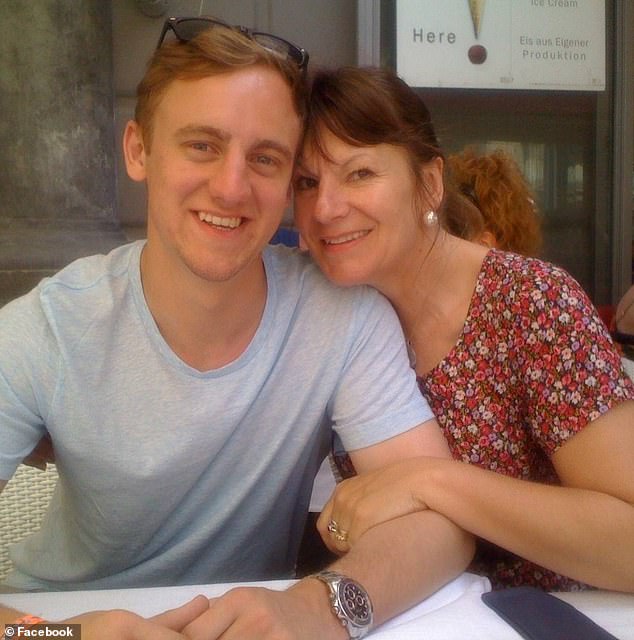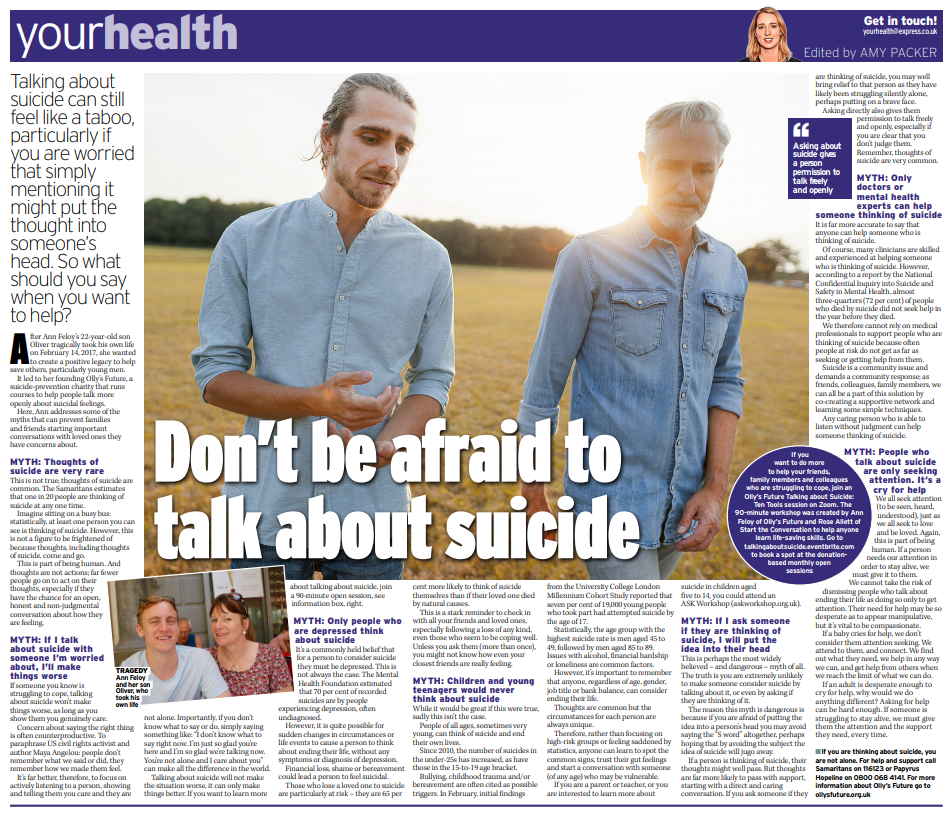Talking about suicide can still feel like a taboo, particularly if you are worried that simply mentioning it might put the thought into someone’s head. So what should you say when you want to help?
After Ann Feloy’s 22-year-old son Oliver tragically took his own life on February 14, 2017, she wanted to create a positive legacy to help save others, particularly young men. It led to her founding Olly’s Future, a suicide-prevention charity that runs courses to help people talk more openly about suicidal feelings. Here, Ann addresses some of the myths that can prevent families and friends from starting important conversations with loved ones they have concerns about.

MYTH: Thoughts of suicide are very rare
This is not true; thoughts of suicide are common. The Samaritans estimate that one in 20 people are thinking of suicide at any one time. Imagine sitting on a busy bus: statistically, at least one person you can see is thinking of suicide. However, this is not a figure to be frightened of because thoughts, including thoughts of suicide, come and go. This is part of being human. And thoughts are not actions; far fewer people go on to act on their thoughts, especially if they have the chance for an open, honest, and non-judgmental conversation about how they are feeling.
MYTH: If I talk about suicide with someone I’m worried about, I’ll make things worse
If someone you know is struggling to cope, talking about suicide won’t make things worse, as long as you show them you genuinely care. Concern about saying the right thing is often counterproductive. To paraphrase US civil rights activist and author Maya Angelou: people don’t remember what we said or did, they remember how we made them feel. It’s far better, therefore, to focus on actively listening to a person, showing and tell them you care and they are not alone. Importantly, if you don’t know what to say or do, simply saying something like: “I don’t know what to say right now. I’m just so glad you’re here and I’m so glad we’re talking now. You’re not alone and I care about you” can make all the difference in the world. Talking about suicide will not make the situation worse, it can only make things better.
MYTH: Only people who are depressed think about suicide
It’s a commonly held belief that for a person to consider suicide they must be depressed. This is not always the case. The Mental Health Foundation estimated that 70 percent of recorded suicides are by people experiencing depression, often undiagnosed. However, it is quite possible for sudden changes in circumstances or life events to cause a person to think about ending their life, without any symptoms or diagnosis of depression. Financial loss, shame, or bereavement could lead a person to feel suicidal. Those who lose a loved one to suicide are particularly at risk – they are 65 percent more likely to think of suicide themselves than if their loved one died by natural causes. This is a stark reminder to check in with all your friends and loved ones, especially following a loss of any kind, even those who seem to be coping well. Unless you ask them (more than once), you might not know how even your closest friends are really feeling.

MYTH: Children and young teenagers would never think about suicide
While it would be great if this were true, sadly this isn’t the case. People of all ages, sometimes very young, can think of suicide and end their own lives. Since 2010, the number of suicides in the under-25s has increased, as have those in the 15-to-19 age bracket. Bullying, childhood trauma, and/or bereavement are often cited as possible triggers. In February, initial findings from the University College London Millennium Cohort Study reported that seven percent of 19,000 young people who took part had attempted suicide by
the age of 17. Statistically, the age group with the highest suicide rate is men aged 45 to
49, followed by men aged 85 to 89. Issues with alcohol, financial hardship, or loneliness are common factors. However, it’s important to remember that anyone, regardless of age, gender, job title, or bank balance, can consider ending their life. Thoughts are common but the circumstances for each person are always unique. Therefore, rather than focusing on high-risk groups or feeling saddened by statistics, anyone can learn to spot the
common signs, trust their gut feelings and start a conversation with someone (of any age) who may be vulnerable. If you are a parent or teacher, or you are interested to learn more about suicide in children aged five to 14, you could attend an ASK Workshop (askworkshop.org.uk).
MYTH: If I ask someone if they are thinking of suicide, I will put the idea into their head
This is perhaps the most widely believed – and dangerous – myth of all. The truth is you are extremely unlikely to make someone consider suicide by talking about it, or even by asking if
they are thinking of it. The reason this myth is dangerous is that if you are afraid of putting the idea into a person’s head you may avoid saying the “S word” altogether, perhaps
hoping that by avoiding the subject the idea of suicide will just go away. If a person is thinking of suicide, their thoughts might well pass. But thoughts are far more likely to pass with support, starting with a direct and caring conversation. If you ask someone if they are thinking of suicide, you may well bring relief to that person as they have likely been struggling silently alone, perhaps putting on a brave face. Asking directly also gives them permission to talk freely and openly, especially if you are clear that you don’t judge them. Remember, thoughts of suicide are very common.

MYTH: Only doctors or mental health experts can help someone thinking of suicide
It is far more accurate to say that anyone can help someone who is thinking of suicide. Of course, many clinicians are skilled and experienced at helping someone who is thinking of suicide. However, according to a report by the National Confidential Inquiry into Suicide and
Safety in Mental Health, almost three-quarters (72 percent) of people who died by suicide did not seek help in the year before they died. We therefore cannot rely on medical
professionals to support people who are thinking of suicide because often people at risk do not get as far as seeking or getting help from them. Suicide is a community issue and demands a community response; as friends, colleagues, family members, we can all be a part of this solution by co-creating a supportive network and learning some simple techniques. Any caring person who is able to listen without judgment can help someone thinking of suicide.
MYTH: People who talk about suicide are only seeking attention. It’s a cry for help
We all seek attention (to be seen, heard, understood), just as we all seek to love and be loved. Again, this is part of being human. If a person needs our attention in order to stay alive, we must give it to them. We cannot take the risk of dismissing people who talk about
ending their life as doing so only to get attention. Their need for help may be so desperate as to appear manipulative, but it’s vital to be compassionate. If a baby cries for help, we don’t consider them attention-seeking. We attend to them and connect. We find out what they need, we help in any way we can, and get help from others when we reach the limit of what we can do. If an adult is desperate enough to cry for help, why would we do anything differently? Asking for help can be hard enough. If someone is struggling to stay alive, we must give them the attention and the support they need, every time.
If you are thinking about suicide, you are not alone. For help and support call Samaritans on 116123 or Papyrus Hopeline on 0800 068 4141.
The Daily Express features an article on the myths around suicide today by Ann Feloy, founder of Olly’s Future, and Rose Allett of Start the Conversation. To learn the skills to help someone who is thinking of suicide go to https://ollysfuture.org.uk/tas10/



